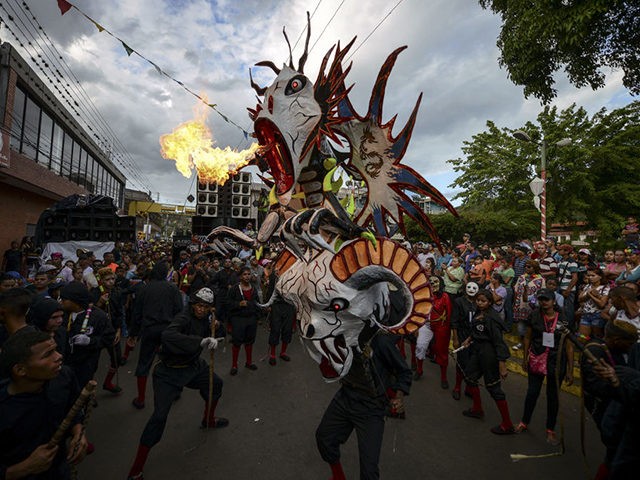Venezuela abruptly ended a strict lockdown, an attempt to fight the Chinese coronavirus pandemic, this week after dictator Nicolás Maduro announced the official start of carnival season.
Venezuela has documented 131,096 cases of Chinese coronavirus in the country and 1,247 deaths, significantly fewer cases than neighbors Colombia and Brazil. Widespread speculation exists that the total collapse of the Venezuelan healthcare system, which occurred years before the pandemic, has made it impossible for the Maduro regime to properly keep track of the virus’s spread. Polling indicates that most Venezuelans told they have Chinese coronavirus do not receive PCR tests and thus do not form part of official statistics.
No evidence of a decline in the number of cases preceded Maduro’s decision to end the nationwide lockdown. It is, rather, part of a program Maduro has branded “7+7” in which his government imposes one week, or sometimes two, of strict lockdowns, banning people from free travel, followed by a “flexibilization” of those restrictions for another one or two weeks. The last “flexibilization” occurred during the Christmas holiday and preceded strict lockdowns in January.
No other country in the world has imposed such a system and no scientific evidence exists that it works better to contain the virus than either long-term lockdowns or systems that do not restrict movement.
Venezuelans may move freely from February 8 to February 17, Ash Wednesday, in recognition of the annual tradition of Carnaval. The socialist regime has thus rebranded its strategy “7+10,” not “7+7.” Maduro announced carnivals as the reason for an end to the lockdowns but expressly warned that restrictions still prohibited caravans, concerts, or other mass gatherings. On February 18, Venezuela will enter what the regime refers to as “radical quarantine.”
“There won’t be concerts the way there usually are,” Maduro said in public statement. “I have been talking to governors, mayors and governors, especially in La Guaira, they will choose their carnival queen with biosecurity measures and the least ruckus possible. Everything is possible if we take care of ourselves.”
Maduro boasted that this unproven method of disease containment was “much better than in the U.S., Europe, Colombia, and Brazil, much better than those countries who can’t stop claiming to be the best.” Maduro went on the claim that the Chinese coronavirus pandemic had “disrobed” the failures of capitalism, according to state television network VTV.
According to the Venezuelan outlet Runrunes, Venezuelans will still be allowed to visit beaches and venues will be allowed to open to up to 40 percent of their capacity. Given the dire state of the Venezuelan economy, however — where the bolívar has lost almost all its value as a currency — it remains unclear how many Venezuelans will have the money to travel or patronize any remaining businesses.
While Maduro has banned Venezuelans from organizing concerts, he has not ceased to attend them. On Sunday, Maduro posted a video of himself enjoying a personal performance from a traditional Venezuelan dance troupe in recognition of the opening of carnival season.
Maduro similarly shocked Venezuelans by broadcasting a large birthday celebration for himself in November, amid lockdown restrictions. While many in attendance appeared to be wearing sanitary masks, they also appeared in close quarters at the presidential palace, Miraflores. Maduro enjoyed a large cake designed in the form of the Venezuelan flag, an affront to most Venezuelans who cannot afford or secure access to three meals a day.
Unlike many of its Latin American neighbors, Venezuela has yet to begin distributing Chinese coronavirus vaccines. Maduro has personally expressed support only in one of the options, the poorly tested “Sputnik V” Russian vaccine candidate and his regime has claimed that the first batch of doses of the product will arrive in the country next week. Maduro said he expected 100,000 doses to arrive and that they would be distributed to health workers first. Maduro reportedly attempted to participate in the COVAX program, run by the World Health Organization (W.H.O.) to help developing countries purchase vaccine doses, but COVAX organizers said this week that his regime had yet to pay into the program.
While Venezuela awaits the arrival of the hastily-approved “Sputnik V,” Maduro has used his platform to promote coronavirus “cures” that experts say have no effect at best and may be deadly at worst. The two “cures” Maduro has most often touted are the use of “rectal ozone therapy” to fight the coronavirus — in which patients are forced to ingest ozone, a toxic gas, rectally to kill coronavirus — and “miracle droplets” allegedly blessed by a Venezuelan saint. International public health experts have warned that, while ozone gas appears to kill Chinese coronavirus, the doses necessary to kill viral loads present in a patient are greater than what a human body can withstand.
Maduro nonetheless launched a “national ozone center” in January to promote the practice.
The cures have caused tensions between Maduro and social media companies, which he regularly uses to publish socialist propaganda. In a televised rant last week, Maduro accused Facebook founder Mark Zuckerberg of being an “abuser” for censoring a post promoting the “miracle droplets.”

COMMENTS
Please let us know if you're having issues with commenting.